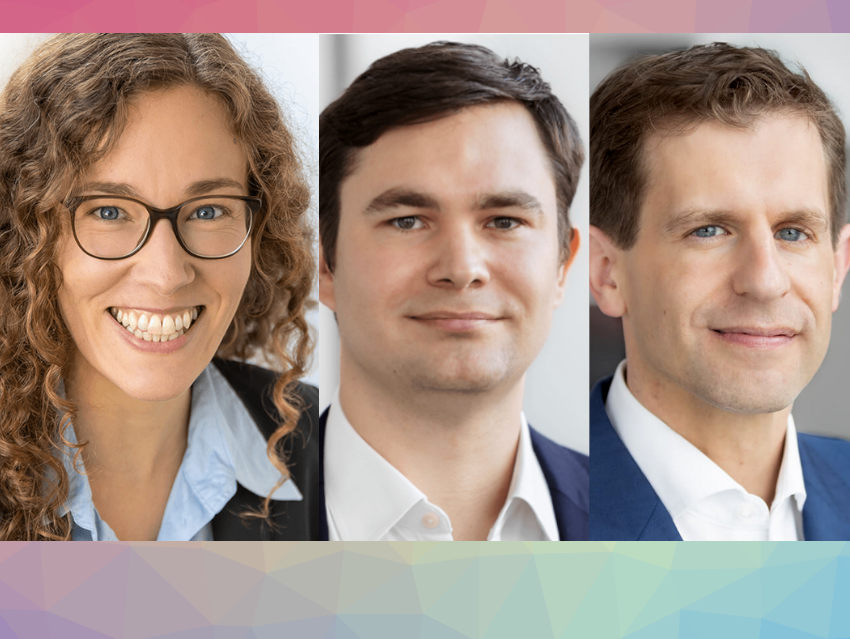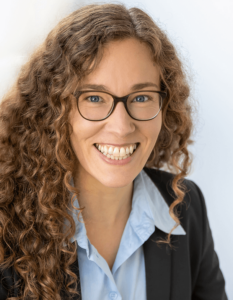Dr. Katharina Peters, Dr. Jan Engels, and Dr. Nikolaus Raupp are investment managers at High-Tech Gründerfonds (HTGF), a venture capital company that focuses on supporting ambitious technology entrepreneurs from the seed phase onwards. Here, they talk with Dr. Vera Koester for ChemistryViews about how they identify promising start-ups, the risks and rewards of start-ups, and what they enjoy most about their work.
High-Tech Gründerfonds (HTGF) finances technology start-ups with growth potential. What does your job look like? How much work do you do with the teams and organizations of the start-ups?
Nik: We are very active to meet as many start-ups as possible, so we participate in a lot of events, business plan competitions, etc. We listen to start-up presentations (pitches) and if the idea seems interesting for us, we start our due diligence process to learn as much as we can.
Jan: Exactly. As an investment manager, you must manage everything from A to Z. In the early phase, for example, you start with an introductory call with the founders, then follow with a pitch, due diligence, contract negotiations, and closing of the deal.
Katharina: And there are many more steps to be taken before a potential exit [Ed. note: realising an investment, e.g., sale or initial public offering (IPO: company’s shares become publicly tradable on the stock exchange)]. We are very close to the founders and support them with our network and expertise whenever we can. As such, we are a partner through thick and thin.
How do you recognize promising start-ups? Is it easier to get funding if the start-up serves a “hot topic”?
Katharina: There are of course trending topics, such as the circular economy or anything around sustainability. However, it doesn’t necessarily get easier with a hot topic, but more difficult. We see lots of them and there is therefore strong competition.
Nik: We are always on the lookout for future hot topics, in other words, for areas that are currently being critically discussed and for potential that is perhaps not yet visible to everyone.
Jan: The three most important evaluation criteria are still team, technology, and market. In the life sciences and chemistry, patent and intellectual property (IP) protection is also a crucial requirement.
Why is it profitable for venture capital firms to fund start-ups? Is it primarily about finances, and how important are the mission and values of a start-up?
Jan: If a start-up grows successfully, the valuation of the company often increases much faster compared to regular stocks or other assets.
Nik: The business case simply has to be right. The product must be able to establish itself competitively on the market.
Katharina: But of course, impact, values, and mission are all very important. There are certain areas in which we do not invest, such as in weapons or gambling. We apply ethical standards.
How important are your experiences as a researcher and entrepreneur, as well as from management consulting?
Katharina: At HTGF, we have a diverse team with many different backgrounds. Our team has a range of experience and skills, some of which each investment manager brings to the table individually, and others which are covered within the team: academia, industry know-how, entrepreneurial expertise, and of course finance in general. This helps us to understand the technology and support the founders as we can share our accumulated expertise.
Nik: Based on my experience working in the chemical industry, I know the challenges of scaling up new sustainable technologies and selling them into different industries.
Jan: Being a former entrepreneur helps me to understand other founders. It also helps to gain trust when founding teams hear that I have sat on their side before and have experienced fundraising myself from a founder’s perspective. In addition, having an academic background in life sciences makes it easier to understand and evaluate the technology.
Katharina: I can only agree with Jan. And with management consulting, you train how to adopt a strategic far-reaching view and how to work very efficiently, which are both things that are also important for founders.
What do you enjoy most about your job?
Jan: What I enjoy most is working with lots of highly committed founders and entrepreneurs.
Katharina: For me, it is getting to know lots of exciting new technologies.
Nik: I find it fascinating to see how a small idea grows into a real company.
How risky is it to start a company? What happens if you fail?
Katharina: It is obvious that there are not just unicorns in this market. We see many companies developing into successful small- to mid-size enterprises (SMEs) that are strengthening the German technology landscape. But of course, there are failures as well.
Jan: Indeed, it is a high-risk endeavor, especially in life sciences and chemistry. In life sciences, it often involves clinical trials and regulatory approval, which are high hurdles to overcome and expensive to finance. In chemistry, scale and cost are critical. You may have a new reaction mechanism or catalyst, but for the chemical industry it is important to have large volumes, so up-scaling is needed in combination with low price.
Nik: About a third of start-ups fail. But failure is part of the game.
Katharina: And it does not mean that your career is over. You learn a lot along the way and there is always a next step.
The USA and universities like MIT are said to create favorable conditions for scientists to start their own businesses. Does Europe have to catch up?
Jan: I think there is already a change in mindset, especially at universities and tech transfer offices. At universities, the problem used to be that everything was published in scientific journals. Nowadays, a patent is often filed first before the scientific results are published, which boosts the chances that a potential start-up will receive funding.
Katharina: Yes, there are already many different support measures and consultations in Germany and Europe. One thing worth mentioning in this context is the Exist program specifically for university spin-offs.
In your opinion, what are the reasons why entrepreneurship is often not considered a possible career path among scientists? What could help to change this? What are the main challenges?
Jan: Especially in Germany, large companies pay quite well if you have an academic background, for example, a Ph.D. in chemistry. Many people would prefer to have a more stable job compared to being an entrepreneur with little or no salary and non-fixed working hours on evenings and weekends.
Katharina: The option of entrepreneurship could be promoted more to students at university, and examples of successful ventures could be highlighted. And you can also take away the fear of potential failure. There is always a next step, even if the one idea might not have been implemented successfully.
Nik: It could also be a strong sign if successful founders from the chemical sector were to get involved, for example, by investing in new start-ups as business angels.
What advice would you give someone who thinks they have a great research idea and would like to commercialize it? What advice would you give to students in general?
Jan: First, I think it’s about the motivation of the professor, postdoc, or Ph.D. student to start a business, but it’s a wild yet rewarding journey, I must say.
Nik: A general piece of advice might be to always stay curious and dare to think big.
Katharina: But also to take a critical perspective early on and keep an eye on the potential use case or the added value for the customer, rather than the love of one’s own idea.
What was your career path like? During your studies, did you already know that you would one day become an entrepreneur and start your own company? What made you decide to start your own company?
Jan: During my studies in Hong Kong, I attended several entrepreneurship seminars and courses that sparked my interest in starting my own business. But in the end, it was the combination of good technology, a problem to solve, and of course the founding team.
Katharina: I think it’s rarely possible to plan a career path in advance. I didn’t always have that as a big goal in mind. As an entrepreneur, you have many roles and tasks, a lot of freedom, and you learn a lot of new things and implement them quickly. This combination, together with an exciting innovation that you’re passionate about and that the market needs, attracted me at the time.
What else would you like readers of ChemistryViews to know?
Jan: You can still join a large chemical company after they acquire your successful start-up.
Katharina: It’s also never too late to start your own business. We see many founders who bring their many years of experience from the industry.
Who or what inspires you?
Jan: The level of drive you see in entrepreneurship and venture capital. Everyone is highly motivated to get things done and change the world.
Nik: For me, it’s being part of the disruption.
Katharina: The opportunity to have a major impact over a long period of time through start-ups.
Thank you for the interview.
|
|
Katharina Peters studied chemical engineering at Karlsruhe Institute of Technology (KIT), Germany, and gained her Ph.D. there in 2013 for research on the production of organic electronics as well as lithium-ion batteries. She then worked as a Senior Associate at McKinsey & Company, Berlin, Germany. This was followed by different activities, like business or organizational development (COO), in start-ups in Berlin and Karlsruhe. Since 2021, she has been an Investment Manager at High-Tech Gründerfonds (HTGF), Bonn, Germany |
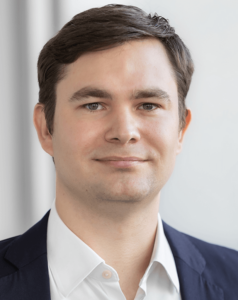 |
Jan Engels studied biotechnology from 2009 to 2013 at Fachhochschule Aachen, Germany, and then went to Hong Kong University of Science and Technology where he received his Ph.D. in chemistry and nanotechnology in 2016. He is a co-founder of Opharmic Technology, Hong Kong, a medical device start-up in ophthalmology and drug delivery, at which he was VP of Technology from 2013 to 2021. Since January 2022, he has been an Investment Manager of Life Science at High-Tech Gründerfonds (HTGF), Bonn, Germany. |
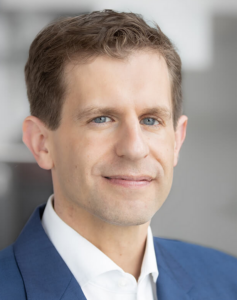 |
Nikolaus Raupp gained his Ph.D. in Economics in 2011 from the University of Duisburg-Essen, Germany. From 2011 to 2018, he held various positions at BASF, Ludwigshafen, Germany, most recently as Global Sustainability Manager, Dispersions & Pigments. From 2018 to 2021 he was Senior Manager of Regional Marketing, Polymer Dispersions for Architectural Coatings, BASF, East Asia Regional Headquarters Ltd., Hong Kong. Since 2021, he has been an Investment Manager of Life Sciences with a special focus on the chemical industry at High-Tech Gründerfonds (HTGF), Bonn, Germany. |
Also of Interest

Petro Lahtinen, founder and CEO of Woodio, considers chemical entrepreneurship to be less risky than pursuing an academic career
 Interview: Can I Become an Entrepreneur and If So, How?
Interview: Can I Become an Entrepreneur and If So, How?
An interview with president of IUPAC, professor, entrepreneur, and author Javier García-Martínez
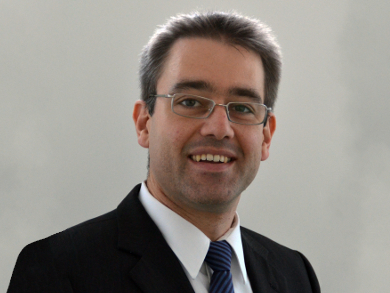 Interview: Chemistry Drives Innovation
Interview: Chemistry Drives Innovation
Entrepreneurship in chemical training and importance of start-ups for innovation
